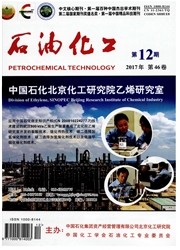

 中文摘要:
中文摘要:
研究了FeCl3-氯代丁基吡啶(FeCl3-[bpc])离子液体催化苯与丙烯烷基化生产异丙苯。实验结果表明,FeCl3-[bpc]离子液体经HCl改性后,在温和的反应条件下,丙烯的转化率与异丙苯的选择性得到显著改善,在20℃、0.1MPa、反应时间5min、苯与丙烯的摩尔比为10:1、FeCl3-[bpc]离子液体与苯的质量比为1:100的条件下,丙烯的转化率由改性前的83.60%提高到100.00%,异丙苯的选择性由90.86%提高到98.47%。实验中还发现,若将该反应分为两个阶段进行,将会获得很好的反应效果。第一阶段主要是烷基化反应,在低温下得到较高的丙烯转化率;第二阶段主要是烷基转移反应,通过适当升高反应温度提高异丙苯的选择性。
 英文摘要:
英文摘要:
Alkylation of benzene with propylene was carried out with FeC13-chloro-butyl-pyridine (FeCl3-[ bpc ] )ionic liquid as catalyst to obtain cumene. Significant improvements in propylene conversion and cumene selectivity under mild reaction conditions were attained by modification of the catalyst with HC1. Under 20℃,0.1 MPa,reaction time 5 min, mole ratio of benzene to propylene 10 : 1 and mass ratio of FeCl3-[ bpc ] to benzene 1 : 100,conversion of propylene can increase from 83.60% to 100.00% and selectivity of cumene can increase from 90.86% to 98.47%. If reaction is carried out in following two stages, the result will be very good. At initial stage of reaction, alkylation is the main reaction. Higher conversion of propylene is obtained at lower temperature. At later stage of reaction, transalkylation is the main reaction and selectivity to cumene can be increased by appropriately raising reaction temperature.
 同期刊论文项目
同期刊论文项目
 同项目期刊论文
同项目期刊论文
 期刊信息
期刊信息
